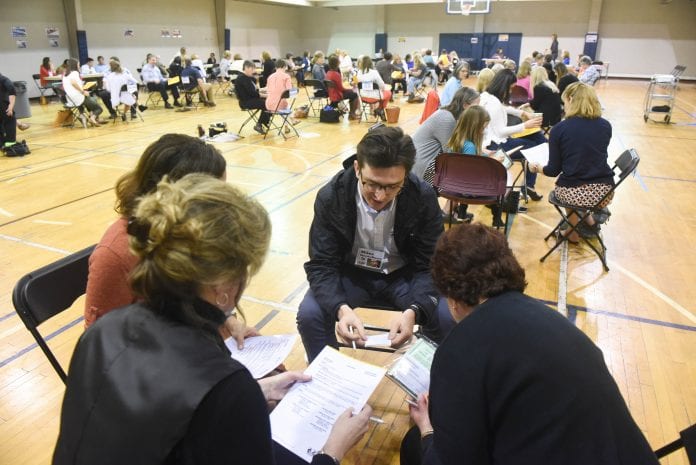Running around a crowded gym carrying paper money and wearing a nametag detailing the role they were given, nearly 100 Belmont College of Health Sciences and Nursing (CHSN) faculty and staff filled the Sports Science Center on Wednesday, April 25 to participate in the Community Action Poverty Simulation (CAPS). Booths representing community agencies (social services, school, the bank, a pawn shop and more) lined the walls as participants assumed their roles. Some were experiencing homeless, others represented single parents and even more participated as families with many children — all simulating exactly what it is to live in poverty across America.

The CAPS experience asks participants to meet, and better understand, the day-to-day challenges faced by more than a million Tennesseans who live in poverty. . Armed with bus passes, plastic EBT cards, paper money and more, each person role-played the lives of low-income families. They had the stressful task of providing for basic necessities and shelter on a limited budget during the course of four 15-minute “weeks.”
CHSN hosted the simulation as part of the BeTIP program–Belmont’s Educating Trauma-Informed Professionals Initiative, a program that is funded by Belmont’s receipt of an Adverse Childhood Experiences (ACEs) grant administered through the Department of Children’s Services Building Strong Brains Tennessee Initiative.
Director of Clinical Education in the School of Physical Therapy Gail Bursch participated in the simulation and was given the role of a single mother of two–a 17-year-old son who had dropped out of high school, was selling drugs and had a pregnant girlfriend and a 15-year-old daughter in high school. Her husband had recently left and the family was forced to survive on only $20. Bursch said the experience was incredibly eye-opening and induced significant amounts of stress on she and her family.
“The experience will continue to stick with me,” Bursch said. “Our students, once graduated, will have the opportunity to treat people from all socioeconomic classes and this simulation is important training in ensuring they are able to develop deepened insight and empathy.”
Dean of the College Dr. Cathy Taylor described the importance of trauma-informed professionals throughout health care, noting the impact toxic stress can have on a person’s physical health. “There is constant stress associated with living in poverty,” Taylor said. “Stress associated with not having the resources to pay bills, a lack of transportation and limited access to adequate childcare are just a few examples of that stress. And we know the developing young brain is especially vulnerable to the effects of toxic stress — it can literally disrupt brain development and lead to a host of poor mental and physical health outcomes.”
That’s why Taylor and her team are actively working to ensure their students and graduates are familiar with the effects of poverty throughout our communities. Experiences like the Poverty Simulation provide significant perspective that assists in informing their practice.
“Despite the effects of that stress,” Taylor said, “we also know there are critical periods of development where we can make a difference. Providers who are aware of the traumatic events their patients and clients have experienced can change the conversation from ‘What’s wrong with you?’ to ‘What’s happened to you?’ And then–“And how can we help?'”
In the Fall, the College will host the Poverty Simulation for students–providing another opportunity to build additional perspective and add to their trauma-information education. “This is powerful,” Taylor said. “By ensuring our graduates leave our campus with an understanding of how trauma can impact the people they serve, they will be instruments of healing. We are preparing the next generation of providers to be just that.”
The College plans to host the simulation again in the fall for students.
https://youtu.be/K_6IiKAlJGo



